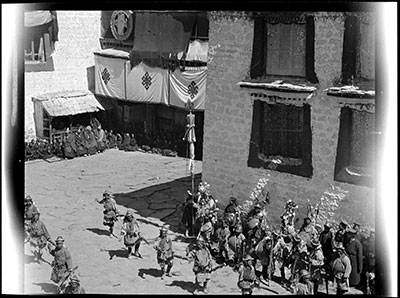
2001.59.1.31.1 (Film negative)


2001.59.1.31.1 (Film negative)

Hugh E. Richardson
Hugh Richardson
March 6th 1937
Lhasa > Jokhang (main entrance from Doring house)
2001.59.1.31.1
54 x 43 mm
Performing , Ritual Activity
Negative film nitrate
Donated August 2001
The executors of the estate of Hugh E. Richardson
Hugh E. Richardson
Notes on negative album - '1' ''Chipsha:(?) Dzonggyab (rdzong rgyab): Torgyap (gtor rgyag)- [illegible]'
Manual Catalogues - Notes on negative album - '1' 'Chipsha: Dzonggyab [rdzong rgyab]: Torgyap [gtor rgyag] ----- [illegible]' is written in white in Richardson's hand. Notes inside negative album: white label with Richardson's name and address in St. Andrews. [KC 8/7/2006]
Manual Catalogues - Notes on negative index - Folio 31. 'RKANG DMAG'. [KC 17/7/2006]
Manual Catalogues - Richardson's hand list: Negative album No.1 'New Year Ceremonies at Lhasa'. The Smon-lam gtor-rgyag Ceremony on 24th of 1st month for driving out evil. Nos. 31 - 37. 'The Gzim-sbyong nga perform theire exercises. They are divided into two wings, each with its commander. The leaders challenge each other in a dance; the soldiery chant challenges to each other as they line the street, one wing on either side. Eventually they fir e their muskets and (no 37) finish up with a strange circular dance'. [KC 17/7/2006]
Technical Information - This image seems to have been taken with a Zeiss Super Ikonta C camera. This was a 6x9 format camera but came with a film plane mask that enabled 6x4.5 images to be taken. This enabled 16 images to be taken on a roll of 120 film as opposed to 8 without the mask [MS 6/10/2005]
Other Information - Background: See Hugh E. Richardson, Ceremonies of the Lhasa Year , 1993, London: Serindia Publications, pp 39-49 for a description of the Monlam Torgya ( mon lam gtor rgyag) ceremony. "The ceremony of Monlam Torgya is the longest and the most spectacular event of the New Year celebrations. It is the high point of the Yaso's tenure of office and the day for which the Tsisher was the preparation. It brings together religious and secular elements and marks the formal end of the Monlam Chenmo. ... (p. 39) Then the Zimchongpa march nosily up to the forecourt of the Jokhang. Some line the Barkhor while others form up in two files in the centre of the road. They take it in turn to display their martial prowess, singing war songs about Penden Lhamo as they do so. The bowmen brandish their bows and the swordsmen make a great show of fencing. Then those with firearms taunt the opposing rank, challenging them with abusive language much enjoyed by the onlookers. ..." (p.41) [KC 23/10/2006]
Other Information - Dates: In a letter to his parents dated November 6th 1936, Hugh Richardson commented that he was investigating buying a new Zeiss Super Ikonta camera [Hugh Richardson Manuscript Archive, Bodleian Library, MS. Or. Richardson 3 folio 46]. On March 29th 1937 he comments in a further letter to his parents that it would probably be better to use the larger image frame [MS Or Richardson 3 folio 82]. This has assisted the dating of this image to 1937 [MS 6/10/2005]
For Citation use:
The Tibet Album.
"Zimchongpa infantry performing, Monlam Torgyap"
05 Dec. 2006. The Pitt Rivers Museum.
<http://tibet.prm.ox.ac.uk/photo_2001.59.1.31.1.html>.
For more information about photographic usage or to order prints, please visit the The Pitt Rivers Museum.
© The Pitt Rivers Museum